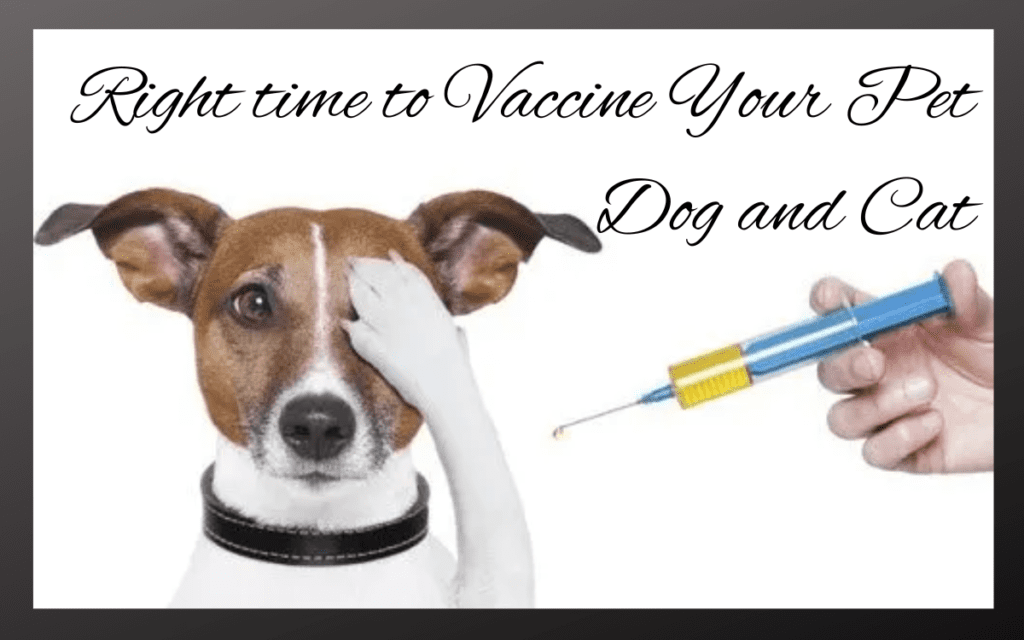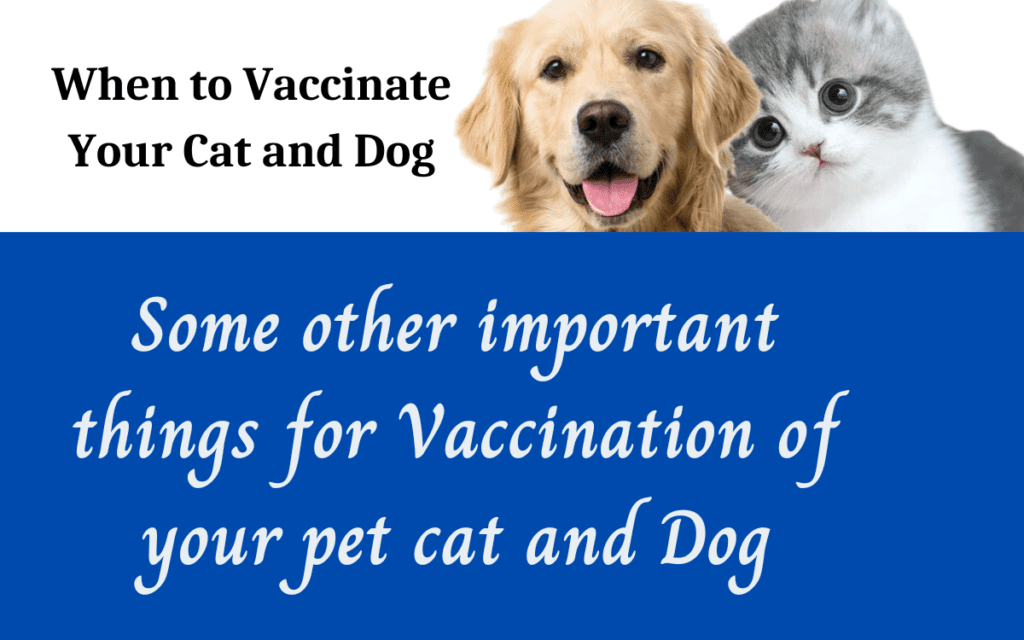Vaccination plays an important role in preventing serious diseases in dogs and cats. The primary goal of vaccination is to protect your pet from disease by stimulating the production of antibodies to prevent the spread of infection. So, it is important to vaccinate your Cat and Dog.
There are many reasons to vaccinate your cat and dog, both for their own health and the health of others. Vaccines help to prevent diseases from spreading and can save lives.
The right time to Vaccine Your Pet Dog and Cat

There are several different vaccines available for cats and dogs including the feline leukemia virus vaccine, distemper vaccine, rabies vaccine, and many others. The AVMA recommends vaccinating dogs and cats against rabies and other infectious diseases throughout their lives to keep them safe and reduce the spread of disease.
It is important to discuss your pet’s vaccination schedule with your veterinarian to determine what vaccinations are right for your furry friend.
Depending on the time of year, frequency of exposure to other animals or dangerous environments, and many other factors,
- The AVMA recommends vaccinating dogs and cats against rabies every 3 years
- Bordetella/Kennel Cough every 6 months
- Feline Leukaemia/FIV every 1 year
- Canine Distemper/Parvo Virus every 2 years.
While these are the most common vaccines that dog and cat owners may want to consider.
There are also additional vaccines available depending on your pet’s lifestyle and situation. For example, many dog owners choose to vaccinate their dogs against Lyme disease and canine influenza.
Also read: What to do After street dog Bite
Why Vaccinate Cat and Dog?

There are many reasons to vaccinate your pet, but one of the top reasons is to protect them from serious diseases. By getting your pet vaccinated, you can help ensure their safety and health.
1. Preventing Disease and Protecting Your Pet’s Health
Vaccines help to prevent many diseases and illnesses in cats and dogs. If a pet does not vaccinate, it is more likely to get sick and develop life-threatening conditions. In rare cases, a vaccine can cause side effects, but these can usually treat easily.
2. Preventing Transmission of Diseases
Because vaccines prevent disease, they can help stop the spread of viruses and other illnesses between pets and people. For example, vaccinating dogs can help prevent them from transmitting rabies to people. It can also help stop the transmission of other diseases such as distemper, parvovirus, and hepatitis to other dogs or cats.
3. Giving Your Pet Longer Life
Proper vaccination is important for the lifelong health of your pet. Many diseases and conditions can prevent with timely vaccination, so it can help give your pet a longer life. Also, vaccines can help prevent serious complications during injury or illness that could shorten your pet’s life.
4. Helping Reduce Antibiotic Resistance
A large amount of antibiotics uses to treat bacterial infections in pets every year. Unfortunately, bacteria can become resistant to these drugs and become more difficult to treat. Proper vaccination can help reduce the need for these dangerous drugs and prevent the development of antibiotic resistance. With these facts in mind, it’s important to stay up to date on your pet’s vaccinations and make sure they get what they need to live a long and happy life!
Why does Dog need vaccination?
Dogs that are up to date on their regular annual vaccinations do not need to get any additional boosters throughout the year unless there are other reasons, such as coming into contact with other unvaccinated dogs or being around other dogs that are prone to contracting an illness, for them to become sick. In these cases, the dog will need to revaccinate to prevent them from developing the disease.
Dogs that are up to date on their regular annual vaccinations do not need to get any additional boosters throughout the year unless there are other reasons, such as coming into contact with other unvaccinated dogs or being around other dogs that are prone to contracting an illness, for them to become sick. In these cases, the dog will need to revaccinate to prevent them from developing the disease.
Cats are generally immune to a number of common viruses and bacteria due to their natural immune system, but they can also become infected with a number of different pathogens.
Some other important things for Vaccination of your pet cat and Dog

There is currently a great deal of debate over the pros and cons of vaccinating both cats and dogs. Some people feel that it is essential to protect both animals from potential diseases. While others believe that there are more important health issues to address that outweigh the risk of vaccination.
The length of a cat or dog’s life is also an important consideration. When choosing whether or not to vaccinate your animal companion. The exact time at which a dog needs to vaccinate depends on a variety of factors. They are including the individual dog’s breed, age, overall health, environment, and risk of exposure to specific viruses.
Most adult dogs should vaccinate at least yearly for rabies and DHPP vaccines. While puppies should receive two doses of DHPP vaccine at least four to six weeks apart. Other vaccine recommendations are on the basis of lifestyle and exposure risk.
Cats usually need to vaccinate at six weeks of age. Two rounds of vaccines are a minimum of four weeks apart. All cats should vaccinate against rabies annually, while other vaccines (such as the FVRCP) depend on your cat’s lifestyle and the environment you live in.
Some owners choose not to vaccinate their pets because they believe that this violates their religious beliefs. However, research has shown that pet vaccination programs can dramatically reduce the incidence of infectious diseases in both cats and dogs. While also helping to prevent the spread of these diseases to people and other pets.
This is especially true in cases where vaccinations are required by law. For these reasons, most help to prevent the spread of these diseases to people and other pets. This is especially true in cases where vaccinations are required by law. For these reasons, most veterinarians strongly support the importance of vaccinations for both cats and dogs.
Puppies and kittens must be vaccinated against certain diseases starting. As soon as they receive their first round of immunizations when they are very young. For example, it is important for puppies to receive their first set of vaccinations by 16 weeks of age to protect them against parvovirus.
Benefits to having a vaccinated pet Dog or Cat
It is also important to make sure that they are fully vaccinated by the time they reach six months of age to avoid missing out on any required vaccines before they can be adopted into a new home. After being adopted into a home, it is also important for puppies and kittens to receive additional booster shots to remain protected against potential illnesses throughout their life.
In some cases, your veterinarian may recommend that your pet receive additional vaccinations after surgery or during any other period of high risk for infection. This is typically done to minimize the chances that your pet will develop an infection after undergoing this type of medical procedure.
Conclusion
It is necessary to vaccinate your pet dog and cat. Because there are many diseases that can be due to the pet dog or cats if we do not vaccinate them. We feel happy when we are healthy from the inside just like that vaccination makes them more healthy. Thus this gives your dog a healthier and happier life.
Also read: Best Dog Food For Allergies




